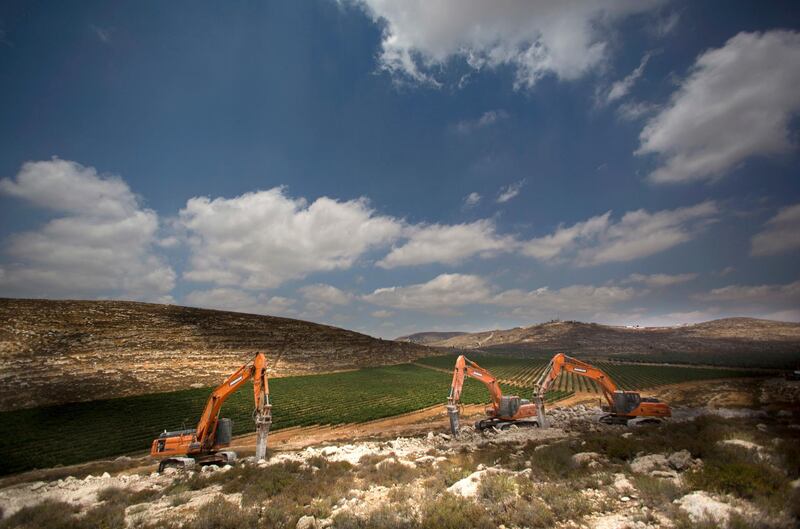Israel’s defence minister has announced that officials responsible for settlement building will approve 3,900 new homes across the West Bank next week, a significant step towards consolidating the country’s grip on occupied Palestinian territory.
Avigdor Lieberman’s announcement of new units in 30 settlements, which the majority of the international community deems illegal, comes less than two weeks after the United States moved its embassy from Tel Aviv to Jerusalem.
The move underscored the congruence of policy towards the Palestinians between the Trump administration and Prime Minister Benjamin Netanyahu’s right-wing government.
Mr Lieberman’s statement came before the meeting of the settlement sub-committee in Israel’s Civil Administration, so the timing of the new construction remains unclear.
But he said that the body would approve 2,500 units for immediate construction, and a further 1,400 to be built at a later date.
"In the coming months we will bring thousands of more units for approval. We will continue to settle and develop Judea and Samaria through actions," he said, referencing the ancient biblical names for the West Bank used in Israeli government parlance and by religious settlers.
While critics of settlement activity stress that all of it is illegal and an impediment to peace with the Palestinians, the planned new units are particularly problematic, according to left-wing Israeli NGO Peace Now, which monitors settlement construction.
One concern is that many of the units are far-flung and outside of land Israel would retain according to the main model compromise agreement with Palestinians, the 2003 Geneva Initiative.
"Netanyahu has gotten carte blanche from Trump to destroy the two state solution," said Hagit Ofran, Peace Now's settlements monitor. "Here we are talking about building a lot in areas where Israel would need to evict settlers, making it much harder to get an agreement."
For example, 60 units are planned for the Halamish settlement north of Ramallah and 80 units for Hinanit, west of Jenin in the northern West Bank. The large settlement of Ariel, which juts deep into the West Bank, will get 400 new units, while the sprawling Maale Adumim settlement near Jerusalem, will increase by 460 units.
Since the 71-year-old took office in Jan. 2017, over 13,500 settlement units have been planned or had tenders issued for them, a major increase compared to the rate during the Obama administration, according to Peace Now. While Obama officials would rhetorically condemn settlement activity, the Trump administration has not only stopped doing that, it has begun to legitimise the settlements.
____________
Read more
A self-immolation shines light on Gaza’s despair
Trump's Israel envoy incites Al Aqsa fury online
Comment: the choice of life in an open-air prison or being shot is no choice
____________
The settlements constitute a violation of the Fourth Geneva Convention's prohibition on moving nationals of the occupying power into the occupied territory. But last month, the State Department for the first time dropped the designation "occupied territory" when referring to the West Bank in its annual human rights report.
Palestinians fear that the same rationale the US applied to its recognition of Jerusalem as Israel's capital will now be applied to the settlements in the West Bank. In justifying the embassy move, Mr Trump said it amounted to "nothing more or less than recognition of reality." By this reasoning Israel's facts on the ground in the West Bank could be recognised also.
About 600,000 Israelis live in over 200 settlements in the West Bank and East Jerusalem, according to the Israeli human rights group B'Tselem. That is nearly a fifth of the Palestinian population of those areas.
Mr Lieberman's announcement "shows that the Americans have no peace plan and that Israel is not interested in peacemaking,” said Abdullah Abdullah, a member of the Palestinian Legislative Council who supports President Mahmoud Abbas.
“The United States is shielding Israel from any accountability, from international law and is enabling it to break security council resolutions. This will encourage more violence, more extremism and the absence of stability in the region”.
PLO executive committee member Hanan Ashrawi said Israel was emboldened by the US embassy opening in Jerusalem as well as those of Guatemala and Paraguay following suit.
She added that the Israeli plan to expand settlements "affirms the need for the International Criminal Court to open an immediate criminal investigation into Israel's flagrant violations of international law and conventions”. The Palestinians submitted a request to the ICC on Tuesday.
In another sign that the Trump administration is diluting the US stance on Israeli-occupied territory, the Israeli Intelligence Minister Israel Katz has said he expects that Washington will recognise Israel’s sovereignty over the Golan Heights. Israel seized the territory from Syria in the 1967 Arab-Israeli War and annexed it in 1981.
The occupied area forms a strategic plateau between Israel and Syria of about 1,200 square kilometers (460 square miles).
Mr Katz, a member of Prime Minister Benjamin Netanyahu's security cabinet, cast the Golan proposal as a potential extension of the Trump administration's confrontational tack against Iran, Israel's arch-enemy.
“This is the perfect time to make such a move. The most painful response you can give the Iranians is to recognise Israel's Golan sovereignty - with an American statement, a presidential proclamation, enshrined (in law),” he said.
The matter, raised by Mr Netanyahu in his first White House meeting with Mr Trump in February 2017, is now under discussion at various levels of the US administration and Congress, Mr Katz said.
"I reckon there is great ripeness and a high probability this will happen," he said. Asked if such a decision could be made this year, he added: "Yes, give or take a few months".





